Guwahati, May 29: Despite 17 days since the tragic incident of death of 18 elephants in Bamunipahar hillock of Assam’s Nagaon district, a detailed investigation report into the incident is still awaited.
On May 14, two days after the incident, Assam government had instituted a seven-member committee headed by Deputy Conservator of Forest, K.K. Deori. Assam Forest Minister, Parimal Suklabaidya had said that the committee would submit its report within 15 days.
The proposed timeline expired on Saturday.
An initial report had earlier suggested the cause of the death of the elephants due to a lightning strike. The enquiry committee was supposed to look into other possible causes of death like poisoning and disease in its investigation.
Given the failure of the government to make the findings of the enquiry committee public within the proposed timeline, wildlife activists and experts in the state who has been voicing serious doubt on the initial report on the cause of death, now claim foul play into the enquiry.
Soumyadeep Dutta, founder of Nature’s Beckon- an Environment Activist Group, on Monday said the Assam government in an attempt to hide the real cause of death of elephants is delaying its investigation.
“All this while we have been saying that lightning was not the cause of the mass death of elephants, the Forest Minister, since day one, is trying to build such a narrative. A histopathological report from the Nagaon Divisional Forest Office is being circulated as a post mortem report. Without any scientific investigation into the incident, we suspect that the elephants were rather killed as there is such motive to do so. Taking advantage of the Covid-19 situation, the government is trying to cover up the findings into the deaths”
The Bamunipahar hillock in the Kundoli Proposed Reserve Forest is under industrialisation with a solar plant, several stone queries and rapid deforestation. Since March 2020, the Adivasi Mikir and Karbi people living in the Bamuni Grant Village in the hillock have been protesting against acquisition of land to set up the solar plant in an area known as a traditional elephant corridor of 150-200 elephants.
Bhaskar Baruah, another wildlife conservationist said, the claim of death of the eighteen elephants by lightning is not supportive of the on ground reality.
“The possibilities of a side-flash lightning, steep potential lightning and direct impact lightning cannot be established in this case. There were bigger trees right above the one the forest department claims to have faced the lightning and led to the death of elephants.
Even after such a tragic occurrence, the soil resistivity and tree resistivity test is not done in this case which is mandatory. In my knowledge there is no geological team examining the site. The trees are in perfect shape, the micro-organisms are alive and even the undergrowth of the trees are not impacted. From this it is obvious that the real reason for killing the elephants is not lightning.”
Activists say the way the bodies of the elephants were found has also raised serious questions on the authenticity of the initial report given by the forest department. The bodies were found in a sitting position. Manash Lochan Das, a scientist and an elephant behaviour researcher has said that lightning can cause death in a fraction of second giving no time for anyone to sit or change its position.
“A normal elephant needs time to sit like the way the bodies were found. If lightning strikes, it would just fall down like it does in humans. The lightning causes severe burns. But it does not make one foaming at the mouth as it can be seen in this case. The physiological symptoms of these elephants that died that day resemble to the ones killed by electrocuted wire fencing. So the government must release a detailed report on the incident.” He said.
“Elephants are not only a part of our ecological asset, but also are of great importance in our culture. The government must come out open about the real reasons behind the deaths,” Said Nava Thakuria, a Guwahati based journalist and a wildlife activist.






